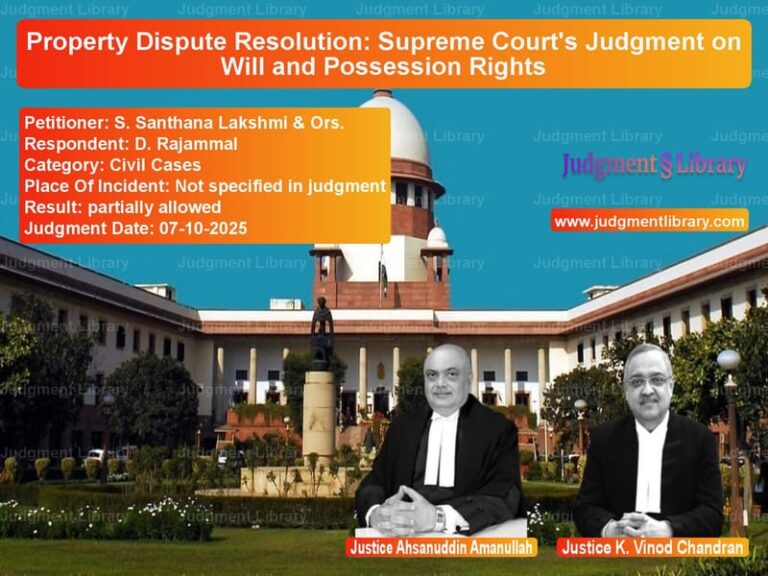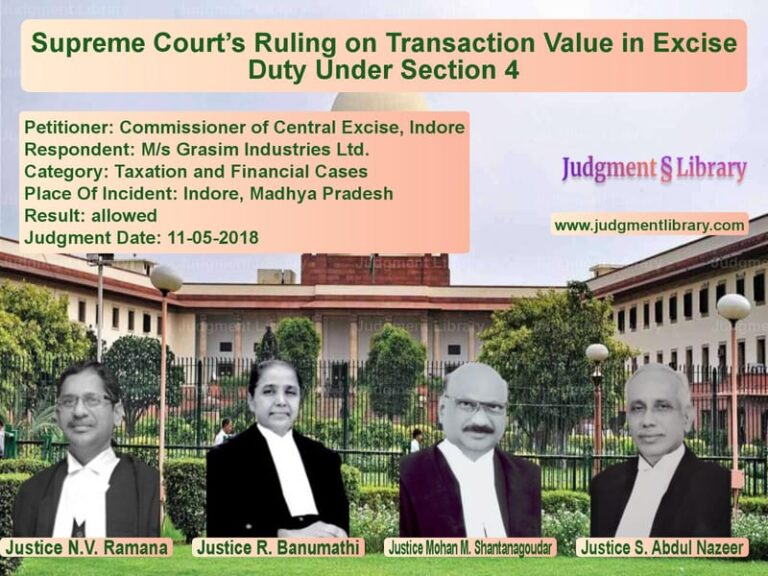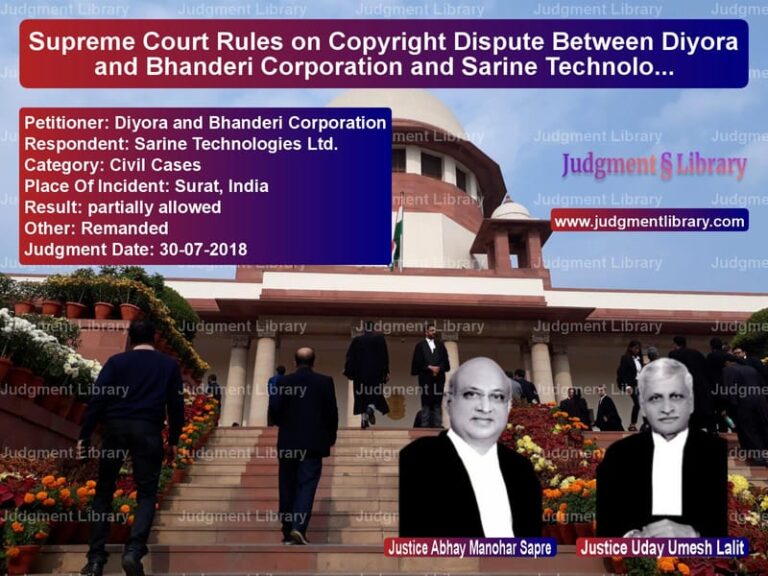Supreme Court Rules on Development Charges in Uttar Pradesh Urban Planning Case
The case of Mathura Vrindavan Development Authority & Another vs. Rajesh Sharma & Others deals with the legality of levying development charges and other fees under the Uttar Pradesh Urban Planning and Development Act, 1973. The Supreme Court upheld the Allahabad High Court’s decision quashing various fees levied by the Development Authorities, except for development charges, which the Court ruled were legally valid. This ruling clarifies the scope of permissible levies and the limitations imposed by statutory provisions.
Background of the Case
The appeals arose from multiple writ petitions filed before the Allahabad High Court challenging the imposition of various charges, including:
- External/internal development charges
- Inspection fee
- Supervision fee for granting layout plan sanctions
- Sub-division charges
- Stacking charges
- Impact fees
While the High Court upheld the levy of development charges, it quashed all other charges, ruling that they were not authorized under the U.P. Urban Planning and Development Act, 1973. The State of Uttar Pradesh and the Development Authorities appealed the decision before the Supreme Court.
Legal Issues Before the Court
- Whether the Development Authorities were legally entitled to levy various charges apart from development fees.
- Whether Section 41 of the U.P. Urban Planning and Development Act, 1973 empowered the state government to authorize such levies.
- Whether the High Court erred in quashing the levies other than development fees.
Arguments by the Petitioners (Mathura Vrindavan Development Authority & Others)
The appellants, represented by senior counsel, argued:
- “The State Government, under Section 41 of the Act, had the authority to direct the levy of charges for urban development.”
- “Development Authorities need these funds to finance infrastructure improvements, including roads, drainage, and public amenities.”
- “The levies were imposed in public interest and were necessary for planned urban growth.”
- “Similar charges have been upheld in previous cases, including State of U.P. vs. Malti Kaul (1996).”
Arguments by the Respondents (Rajesh Sharma & Others)
The respondents, who were landowners and developers, countered:
- “The only permissible levy under the Act is development charges as defined under Section 15(2-A).”
- “All other charges are illegal since they are not expressly mentioned in the Act.”
- “The State Government’s power under Section 41 is limited to policy directions and cannot override statutory provisions.”
- “The levy of charges without clear statutory backing violates Article 265 of the Constitution, which states that no tax shall be levied or collected except by the authority of law.”
Supreme Court’s Analysis and Judgment
The Supreme Court upheld the High Court’s decision, making the following key observations:
- “The authority to impose charges must come from explicit provisions in the statute. Development Authorities cannot impose fees not authorized under the Act.”
- “Section 41 of the Act provides only supervisory powers to the State Government and does not permit it to create new levies.”
- “Development charges under Section 15(2-A) are valid, but other levies such as inspection fees, impact fees, and stacking charges lack statutory backing.”
- “Article 265 of the Constitution prohibits taxation without legislative authorization. Any charge or fee imposed without express legal sanction is unconstitutional.”
The Court ruled:
“The appeal is partly allowed. The levy of development charges under Section 15(2-A) is upheld, but all other levies imposed by the Development Authorities are quashed.”
Key Takeaways from the Judgment
- Development charges imposed under Section 15(2-A) of the Act are legal and enforceable.
- Other charges, including inspection fees, stacking charges, and impact fees, are not permissible.
- State Governments cannot impose additional levies under Section 41 without explicit statutory authorization.
- Urban development levies must conform to constitutional principles, particularly Article 265.
Impact of the Judgment
This ruling provides clarity on the scope of charges that Development Authorities can impose under the U.P. Urban Planning and Development Act, 1973. It reinforces that government authorities cannot impose financial burdens on citizens beyond what is explicitly permitted by law. The ruling also serves as a precedent for similar cases across India, ensuring that urban planning levies remain within legal bounds.
Petitioner Name: Mathura Vrindavan Development Authority & Another.Respondent Name: Rajesh Sharma & Others.Judgment By: Justice M.R. Shah, Justice C.T. Ravikumar.Place Of Incident: Uttar Pradesh.Judgment Date: 28-04-2023.
Don’t miss out on the full details! Download the complete judgment in PDF format below and gain valuable insights instantly!
Download Judgment: mathura-vrindavan-de-vs-rajesh-sharma-&-othe-supreme-court-of-india-judgment-dated-28-04-2023.pdf
Directly Download Judgment: Directly download this Judgment
See all petitions in Property Disputes
See all petitions in Landlord-Tenant Disputes
See all petitions in Damages and Compensation
See all petitions in Contract Disputes
See all petitions in Environmental Cases
See all petitions in Judgment by Mukeshkumar Rasikbhai Shah
See all petitions in Judgment by C.T. Ravikumar
See all petitions in partially allowed
See all petitions in Modified
See all petitions in supreme court of India judgments April 2023
See all petitions in 2023 judgments
See all posts in Civil Cases Category
See all allowed petitions in Civil Cases Category
See all Dismissed petitions in Civil Cases Category
See all partially allowed petitions in Civil Cases Category







